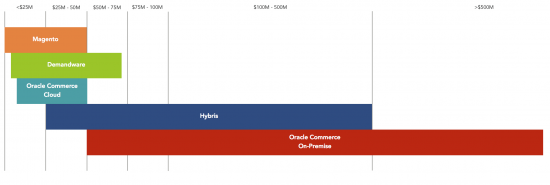What is Oracle Commerce Cloud?
Oracle has been working on their Oracle Commerce Cloud offering for a while, pre-released first in the early Spring of 2015, and publicly launched in June 2015. It was the focus of the Commerce section of the recent Oracle CX 2016 conference in April 2016.
The Commerce Cloud offering is a SaaS eCommerce platform based on the industry leading ATG eCommerce platform Oracle acquired when it purchased ATG in late 2010.
The Good
I absolutely understand why Oracle should be building a SaaS eCommerce solution. There needs to be a solid Oracle solution focused on the traditional mid-market of retailers. ATG Oracle Commerce (On Premise) is not necessarily a great fit for many mid-market retailers. The platform’s strong suits of scalability and flexibility are often more than a retailer doing 20-75 million dollars annually on their online channel needs, and both strengths come with costs: implementation and on-going development on a complex platform (rather than a simple storefront application) and hosting and 24×7 support for the infrastructure and application suite stack.
Currently the mid-market eCommerce market is dominated by Magento (On Prem and SaaS options) and DemandWare (Saas). Both of which offer relatively quick and cheap implementations and on-going costs (when compared to Oracle Commerce) for mid-market customers, and often provide enough features and customizability to meet the needs of that market sector. Both Magento and DemandWare are maturing and pushing further up-market, taking on larger and larger clients with higher traffic and higher revenue websites.
It makes perfect sense for Oracle to push downward into the mid-market, to compete against DemandWare and Magento, not only to protect against marketshare erosion by the encroaching mid-market players, but also to provide what no one else really has: a smooth growth path for companies who’s eCommerce channels will grow from “mid-market” to “enterprise”, or who’s growth will necessitate features and customizations unavailable on traditional mid-market solutions.
Oracle has a lot of strong assets which should make it possible to deliver a solid mid-market SaaS eCommerce offering and grow marketshare in that ecosystem. They have a world class mature eCommerce platform in ATG Oracle Commerce, they have development, hosting, sales, and marketing assets which are virtually unparalleled.
The Bad
Unfortunately the Oracle Commerce Cloud solution isn’t a competitive offering for the mid-market yet. Even after having been live for a year, the feature-set is woefully limited, delivering far less functionality than even the free version of Magento. The vast majority of the ATG Oracle Commerce features are unavailable, or badly hamstrung.
I’ve been told, although I have no way to confirm this myself, that the Oracle Commerce Cloud solution is built not on the current ATG Oracle Commerce platform (version 11.2), but instead is based on version 10.2, released over three years ago.
The biggest “Cloud” SaaS advantage, effortless auto-scaling, doesn’t exist for Oracle Commerce Cloud. Clients have to provide traffic numbers ahead of time, and Oracle doesn’t take responsibility for performance or availability problems if traffic exceeds those estimates. The “Cloud” in Commerce Cloud isn’t what you’d expect.
Every client and system integrator I have spoken with who has hands-on Oracle Commerce Cloud experience has complained about the serious limitations, lack of features, broken functionality, and lack of extensibility of the platform in its current state.
The UI is pretty, but is not well suited to managing large catalogs. Promotions are limited to only four basic types and don’t support common scenarios such as BOGO or category or brand driven multi-item purchase discounts. There’s no support for standard payment types such as Store Credit or Gift Cards. Error messages in the admin are unhelpful things like “Error 20,000”. The promised integrations with Oracle retail products like CPQ don’t exist yet. There’s no hierarchy or inheritance available for custom product types. There are performance issues with large catalogs and with large numbers of custom product or SKU attributes. There are significant FEO and end user performance problems. Etc…
Oracle Commerce Cloud just isn’t ready to compete with Magento and DemandWare. I truly wish it was, and I hope that it will achieve feature parity with the incumbent offerings soon. There is an aggressive roadmap for the Oracle Commerce Cloud offering, however there haven’t been many (any?) significant changes in what is being shown in demos between the initial release a year ago, and the Oracle CX 2016 conference a few weeks ago.
Oracle has certainly committed to the “Cloud” approach. At an enterprise level, Oracle has Cloud Fever. Cloud is the new focus across all their products and services. In the eCommerce universe Oracle is focusing all their sales and marketing efforts behind the Oracle Commerce Cloud solution, so my hope is that the engineering resources brought to bear will be able to really challenge Magento and DemandWare in the SMB and mid-market.
The Ugly
The biggest issue that I have with the Oracle Commerce Cloud is that Oracle is selling it to EVERYONE, mid-market, enterprise, and existing Oracle Commerce customers. They are aggressively pitching it to clients where it is clearly NOT a good fit, and can’t possibly support the features and integrations the client needs. The sales team is being strongly motivated to sell Commerce Cloud instead of “On Prem” as they get virtually no commission or quota progress for the much more mature and comprehensive ATG Oracle Commerce offering.
While there are some opportunities where Oracle Commerce Cloud is a good solution, at this point in time it’s much more likely that the client will discover the product does not actually meet their needs and will be unhappy, or they will realize that upfront and Oracle will lose the deal to DemandWare/Hybris/Magento instead.
Another major problem is that Oracle is publicly talking about Commerce Cloud 100% of the time. The roadmap for that solution is detailed and expansive. In contrast the core ATG Oracle Commerce platform, which has been adopted as the core of eCommerce for hundreds of major global companies, has virtually no roadmap, and appears to be getting zero attention from Oracle (Sales, Marketing, Engineering). At the Oracle CX 2016 conference, there was no content about Oracle Commerce, everything was focused on Commerce Cloud, even though most of the attendees focused on the eCommerce tracks were existing customers who have massive investments in their On Prem ATG Oracle Commerce platforms, and who couldn’t move to the Cloud solution (due to lack of features and integrations) even if they wanted to (which most do not). These companies, as well as the ecosystem of Oracle Commerce system integrators, are feeling betrayed by Oracle, and are not seeing a viable future for the platform they have embraced so fully and invested in so heavily.
In my 18 years in the ATG ecosystem I have never heard so many long time ATG Oracle Commerce clients so angry, and talking so seriously about re-platforming on non-Oracle eCommerce solutions. System Integrators who have been ATG shops since their creation are embracing Hybris and Magento because Oracle isn’t selling any new Oracle Commerce deals. Oracle has a major damage control situation here, and I haven’t seen any sign that they realize it.
To be clear, I am a committed believer in the on-premise ATG Oracle Commerce platform. It has the best technology, and is a great choice for large enterprise retailers (and others). There are so many major companies who have fully invested in ATG Oracle Commerce, who could never move to a SaaS offering, that I feel there’s just no way for Oracle to pull the plug on such an important, and revenue generating, product offering.
Here’s hoping that Oracle’s “Cloud” frenzy doesn’t sink their leading position in the enterprise eCommerce market space, while they try to grab a little slice of the mid-market.


Leave a Reply